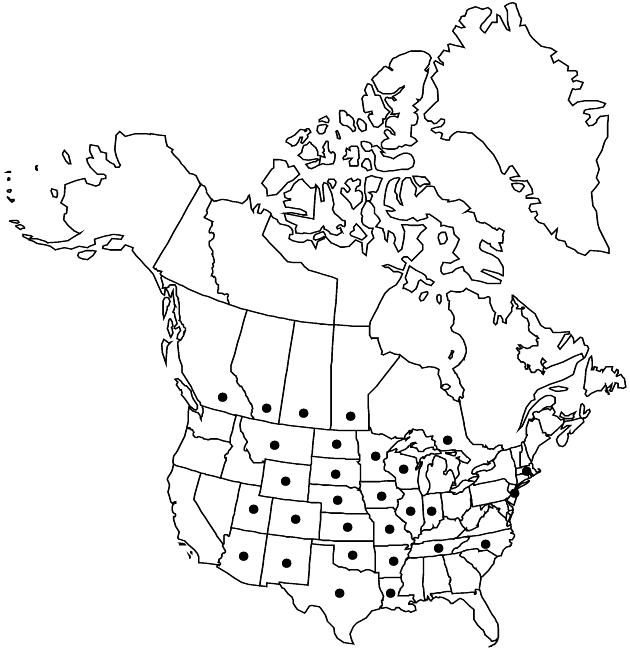Difference between revisions of "Ratibida columnifera"
Contr. U.S. Natl. Herb. 19: 706. 1915.
FNA>Volume Importer |
FNA>Volume Importer |
||
| Line 30: | Line 30: | ||
|elevation=10–2200 m | |elevation=10–2200 m | ||
|distribution=Alta.;B.C.;Man.;Ont.;Sask.;Ariz.;Ark.;Colo.;Ill.;Ind.;Iowa;Kans.;La.;Mass.;Minn.;Mo.;Mont.;Nebr.;N.J.;N.Mex.;N.C.;N.Dak.;Okla.;S.Dak.;Tenn.;Tex.;Utah;Wis.;Wyo.;Mexico (Chihuahua;Coahuila;Hidalgo;Nuevo León;San Luis Potosí;Tamaulipas;Veracruz). | |distribution=Alta.;B.C.;Man.;Ont.;Sask.;Ariz.;Ark.;Colo.;Ill.;Ind.;Iowa;Kans.;La.;Mass.;Minn.;Mo.;Mont.;Nebr.;N.J.;N.Mex.;N.C.;N.Dak.;Okla.;S.Dak.;Tenn.;Tex.;Utah;Wis.;Wyo.;Mexico (Chihuahua;Coahuila;Hidalgo;Nuevo León;San Luis Potosí;Tamaulipas;Veracruz). | ||
| − | |discussion=<p>Ratibida columnifera is grown as an ornamental and is often included in wild flower plantings. Such activities may extend the geographic range of the species to roadsides and prairie-like habitats.</p><!-- | + | |discussion=<p><i>Ratibida columnifera</i> is grown as an ornamental and is often included in wild flower plantings. Such activities may extend the geographic range of the species to roadsides and prairie-like habitats.</p><!-- |
| − | --><p>Some variants of Ratibida columnifera have been treated as varieties or forms. The most prominent of these is forma pulcherrima (de Candolle) Fernald, which is characterized by its showy, purplish yellow to purple rays; it is more frequent in the southwestern part of the range of the species. In the typical form, rays are yellow (E. L. Richards 1968).</p><!-- | + | --><p>Some variants of <i>Ratibida columnifera</i> have been treated as varieties or forms. The most prominent of these is forma pulcherrima (de Candolle) Fernald, which is characterized by its showy, purplish yellow to purple rays; it is more frequent in the southwestern part of the range of the species. In the typical form, rays are yellow (E. L. Richards 1968).</p><!-- |
| − | --><p>Some authors have argued that Ratibida columnaris (Sims) D. Don is the correct name for this species; J. L. Reveal (1968) and E. L. Richards (1968) provided synoptic discussions of the issue.</p> | + | --><p>Some authors have argued that <i>Ratibida</i> columnaris (Sims) D. Don is the correct name for this species; J. L. Reveal (1968) and E. L. Richards (1968) provided synoptic discussions of the issue.</p> |
|tables= | |tables= | ||
|references= | |references= | ||
| Line 56: | Line 56: | ||
|publication year=1915 | |publication year=1915 | ||
|special status= | |special status= | ||
| − | |source xml=https://jpend@bitbucket.org/aafc-mbb/fna-data-curation.git/src/ | + | |source xml=https://jpend@bitbucket.org/aafc-mbb/fna-data-curation.git/src/8f726806613d60c220dc4493de13607dd3150896/coarse_grained_fna_xml/V19-20-21/V21_135.xml |
|tribe=Asteraceae tribe Heliantheae | |tribe=Asteraceae tribe Heliantheae | ||
|subtribe=Asteraceae (tribe Heliantheae) subtribe Rudbeckiinae | |subtribe=Asteraceae (tribe Heliantheae) subtribe Rudbeckiinae | ||
Revision as of 15:31, 18 September 2019
Perennials, to 105+ cm; taprooted. Leaves 2–15+ × 0.8–6 cm, 1–2-pinnatifid, lobes 3–14, narrowly linear-lanceolate to narrowly oblong-ovate, 1–16 mm wide, faces hirsute, gland-dotted. Heads 1–15, held well beyond leaves. Peduncles (1.5–)6.5–48+ cm (ribs tan, prominent). Phyllaries 5–14, outer linear, 4–14 × 0.5–2 mm, inner lanceolate-ovate, 0.8–3 × 0.8–2 mm. Paleae 2.3–3.5 × 0.5–3 mm, resin glands oval-oblanceolate, 0.6–1.5 mm. Ray florets 4–12; corollas yellow, purplish yellow, or maroon, sometimes bicolor (maroon/yellow), laminae lanceolate-ovate to elliptic-oblanceolate, 7–35 × 4–17 mm. Discs columnar, 10–50 × 7–12 mm. Disc florets 200–400+; corollas greenish yellow, often purplish distally, 1–2.5 mm; style branches 0.5–1.4 mm, proximal 2/3–3/4 stigmatic, apices rounded. Cypselae oblong, 1.2–3 × 1.2–2 mm, abaxial margins glabrous, adaxial margins and apices glabrous or ciliate; pappi (tan) usually of 1–2 toothlike projections, sometimes 0. 2n = 28.
Phenology: Flowering Mar–Nov.
Habitat: Prairies
Elevation: 10–2200 m
Distribution

Alta., B.C., Man., Ont., Sask., Ariz., Ark., Colo., Ill., Ind., Iowa, Kans., La., Mass., Minn., Mo., Mont., Nebr., N.J., N.Mex., N.C., N.Dak., Okla., S.Dak., Tenn., Tex., Utah, Wis., Wyo., Mexico (Chihuahua, Coahuila, Hidalgo, Nuevo León, San Luis Potosí, Tamaulipas, Veracruz).
Discussion
Ratibida columnifera is grown as an ornamental and is often included in wild flower plantings. Such activities may extend the geographic range of the species to roadsides and prairie-like habitats.
Some variants of Ratibida columnifera have been treated as varieties or forms. The most prominent of these is forma pulcherrima (de Candolle) Fernald, which is characterized by its showy, purplish yellow to purple rays; it is more frequent in the southwestern part of the range of the species. In the typical form, rays are yellow (E. L. Richards 1968).
Some authors have argued that Ratibida columnaris (Sims) D. Don is the correct name for this species; J. L. Reveal (1968) and E. L. Richards (1968) provided synoptic discussions of the issue.
Selected References
None.